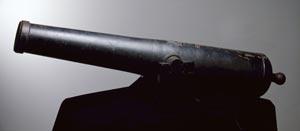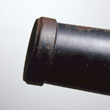The Civil War in Missouri
Save ThisMy CollectionGiles F. Filley and the Excelsior Stove Works

Highlights
- The Excelsior Stove Works was established in 1849 to make products of the Excelsior Manufacturing Company.
- Giles F. Filley, who owned the company, was born February 15, 1815, in Bloomfield, Connecticut.
- Excelsior Manufacturing prospered because of its Charter Oak Stove product, which had a patented hot air flame invented by Filley in 1851. Charter Oak stoves would eventually be used across the country.
In-Depth
The Excelsior Stove Works was established in 1849 to make products of the Excelsior Manufacturing Company. Giles F. Filley, who owned the company, was born February 15, 1815, in Bloomfield, Connecticut. His family could be traced back to the landing of the Mayflower at Plymouth Rock, Massachusetts. He was educated in the public schools of Connecticut, known as common schools at the time, and finished his studies at Wilbraham Academy of Wilbraham, Massachusetts. In 1834, at age 19, he moved to St. Louis to work for his brother, Oliver D. Filley. Excelsior Manufacturing prospered because of its Charter Oak Stove product, which had a patented hot air flame invented by Filley in 1851. Charter Oak stoves would eventually be used across the country.
Struggles
Highlights
- During the Civil War, Excelsior Manufacturing, like many companies, switched to wartime production. Instead of making stoves, it produced cannons and iron armor for James B. Eads’s gunboats.
- Workers went on strike in 1864 over the issues of hiring child and female labor and low wages. In response, Filley fired the strikers. As a result of the strike, Gen. William Rosecrans issued Order No. 65, which used martial law to ban workers from striking or joining unions.
In-Depth
During the Civil War, Excelsior Manufacturing, like many companies, switched to wartime production. Instead of making stoves, it produced cannons and iron armor for James B. Eads’s gunboats. Filley was a staunch Unionist who helped Frank Blair Jr. in the establishment of a Republican Party in Missouri. He supported the war effort by arming a group of his employees and establishing the Union newspaper to support Lincoln. The Union would eventually become the St. Louis Post-Dispatch.
Workers went on strike in 1864 over issues of hiring children labor and low wages. In response, Filley fired the strikers. As a result of the strike, Gen. Rosecrans issued Order No. 65, which used martial law to ban workers from striking or joining unions. Excelsior Manufacturing was again under siege by worker organization in 1877 when the nationwide railroad strike turned into a general strike in St. Louis. Giles Filley led the assault on the strikers that was organized by the businesses and government of the city.
Later Work
Highlights
- Worker unrest did not deter growth. The company would continue its success after the war, helping with the construction of the Eads Bridge that spanned across the Mississippi.
- Eventually, Excelsior changed its name to Charter Oak Stove and Range Company and enjoyed continued success into the 1920s.
- As consumers began to use gas and electric stoves, the company became part of Reynolds Metal Company in 1943 and suspended operations in 1949.
Vocabulary
General strike - a mass strike in all or many trades and industries in a section or in all parts of a country.
Primary Source
